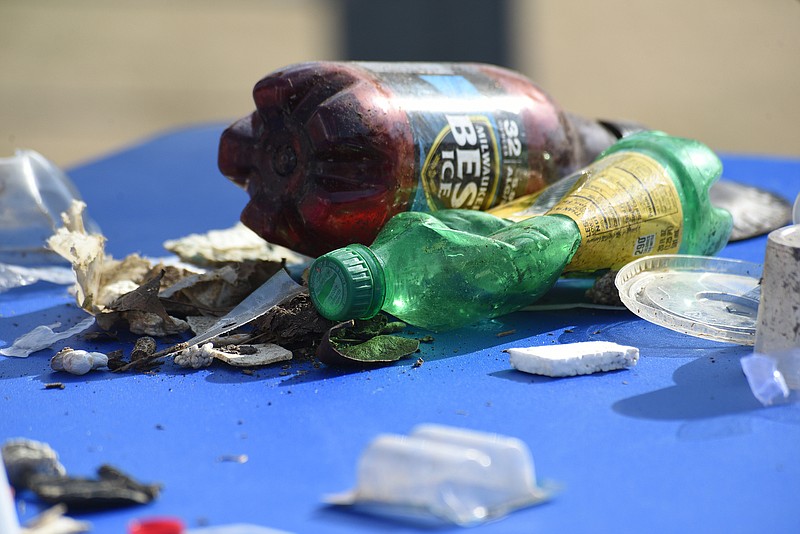The Tennessee River will soon become home to the largest network of litter skimmer and collection devices on any river in the world under a partnership announced Tuesday among Tennessee's transportation department, the nation's biggest litter cleanup foundation and marinas and other attractions in the Tennessee Valley.
The initiative will install 18 Seabin devices along the 652-mile river to help capture debris in the water and, in the process, help educate Americans about the plastics and a host of other garbage flowing into one of America's biggest rivers.
The Seabins were originally developed for ocean cleanup in Australia. But environmental groups are expanding use of the devices into rivers and creeks, where much ocean pollution originates, especially many of the plastic products that continue to accumulate in waterways around the globe.
"Until now, all of our work has been only to prevent microplastics in our waterways, so we are thrilled to be making an effort to actually mitigate microplastics out of the water," Kathleen Gibi, executive director for Keep the Tennessee River Beautiful, said during Tuesday's announcement at the pier on Chattanooga's downtown riverfront.
This year marks the 50th anniversary of the Clean Water Act in the United States, and Tuesday was World Water Day. Despite a 54% drop in highway litter over the past decade, litter along waterways has continued to accumulate.
Keep America Beautiful, a nonprofit group that has worked to limit and clean up litter across America for more than 65 years, estimates there are at least 26 billion items of litter along America's waterways, surpassing the estimated 24 billion along the nation's roads and highways.
"That doesn't even count what is in our water, and 88% of that litter is 4 inches or less," said Randy Hartmann, senior director of affiliate operations for Keep America Beautiful, during Tuesday's event. "These Seabins are designed to really collect a lot of that small litter that we can't physically do as volunteers."
(READ MORE: Tennessee River Rescue 30th Anniversary: Chattanooga community unites to clean waterways, tackle city-wide problem)
More than 700 volunteers organized by Keep the Tennessee River Beautiful collected more than 152,000 pounds of trash along the Tennessee River last year, but Gibi said the Seabins will help collect smaller debris and remove debris in the actual river.
The Seabin devices are essentially large electric skimmers attached to docks that can remove up to 3,000 pounds of trash and debris from the water in one year. The devices also filter out oils, gasoline and microplastics from the water.
Keep American Beautiful selected the Tennessee River as the test pilot of its Seabin project and is providing the 18 electric litter skimmer devices, which collectively could remove as much as 54,000 pounds of trash from the Tennessee River every year.
The Keep Tennessee River Beautiful nonprofit is also getting a $180,0000 two-year grant from the Tennessee Department of Transportation for litter removal, cleanup and the operation of the Seabin project. Local marinas, state parks and the Tennessee Aquarium are helping maintain and clean out the Seabins as they fill up with river debris.
Anna George, vice president of conservation science and education at the Tennessee Aquarium, said the debris collected in the Seabins will be displayed at the aquarium to help alert the public to the plastics and other non-biodegradable materials being dumped into the river and ultimately hurting water quality.
"The Seabins network will give us new opportunities to engage students and the public to show them how litter continuously flows from the land and into our waterways," George said during Tuesday's event.
In 2017, Andreas Fath, a chemistry professor at Germany's Furtwangen University, swam the entire length of the Tennessee River in 34 days and found the water near the surface of the Tennessee River contains microplastic concentrations 80 times higher than those found in Germany's Rhine River.
George said the debris displayed from the river "won't be as attractive as our fish," but she hopes the Seabin collections will impress on people the need to consider what products they discard in their everyday life. Without any changes, Hartmann said scientists estimate plastic pollutants in the world's oceans will weigh more than all of the ocean's fish and aquatic life.
"We're hopeful that we can turn the tide of freshwater plastic around by collaborating with partners like TDOT [Tennessee Department of Transportation], Keep the Tennessee River Beautiful and others to urge the public to reduce single-use plastics, recycle the rest and join in cleanup efforts that help improve our water quality," George said.
Among the 18 sites for the Seabins, the litter collection devices in Southeast Tennessee are in the waterways at Chattanooga's downtown waterfront near the Tennessee Aquarium, at the Harrison Bay State Park in Harrison and at Lake Ocoee Inn and Marina in Benton, Tennessee.
Contact Dave Flessner at dflessner@timesfreepress.com or at 423-757-6340. Follow him on Twitter @dflessner1.

